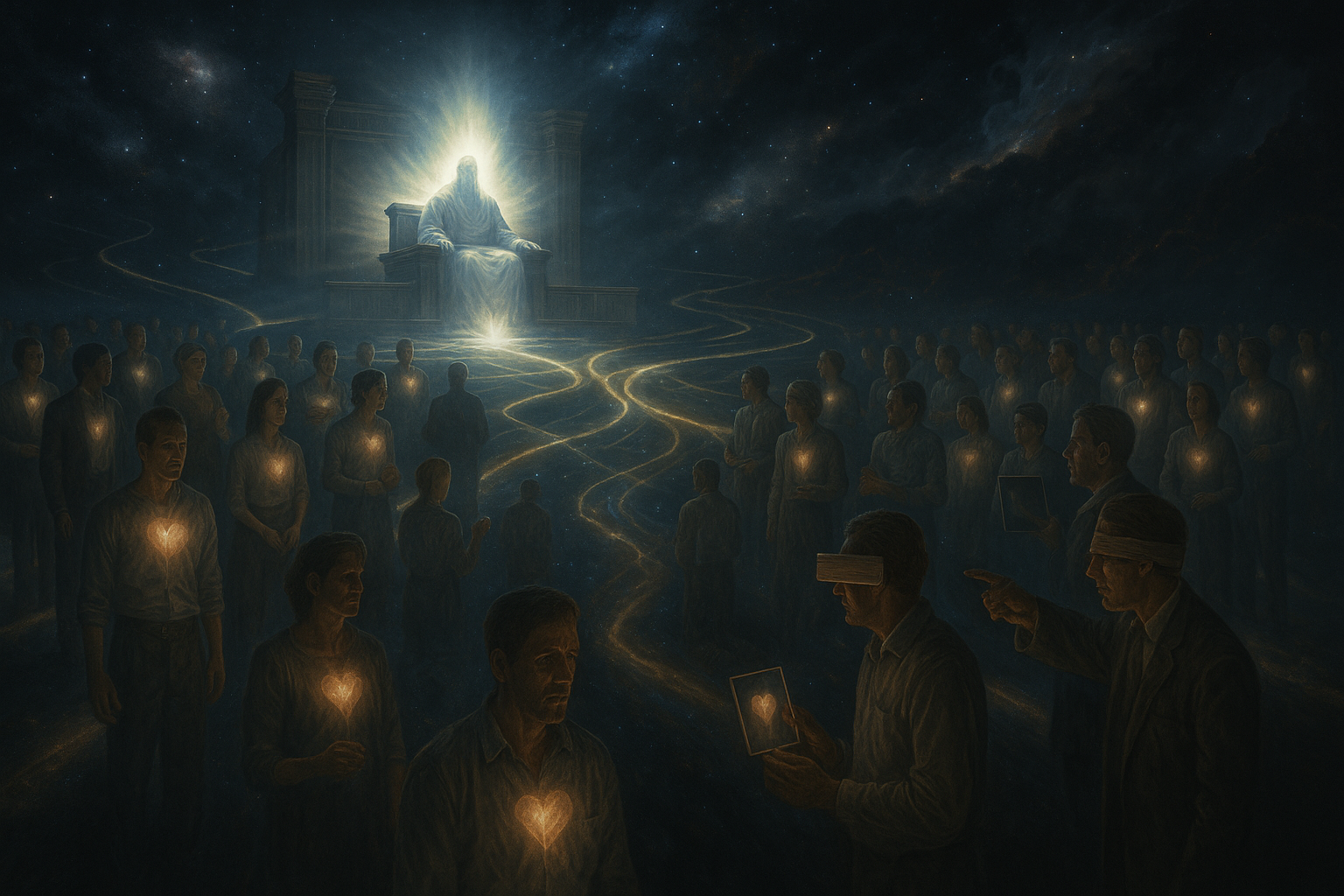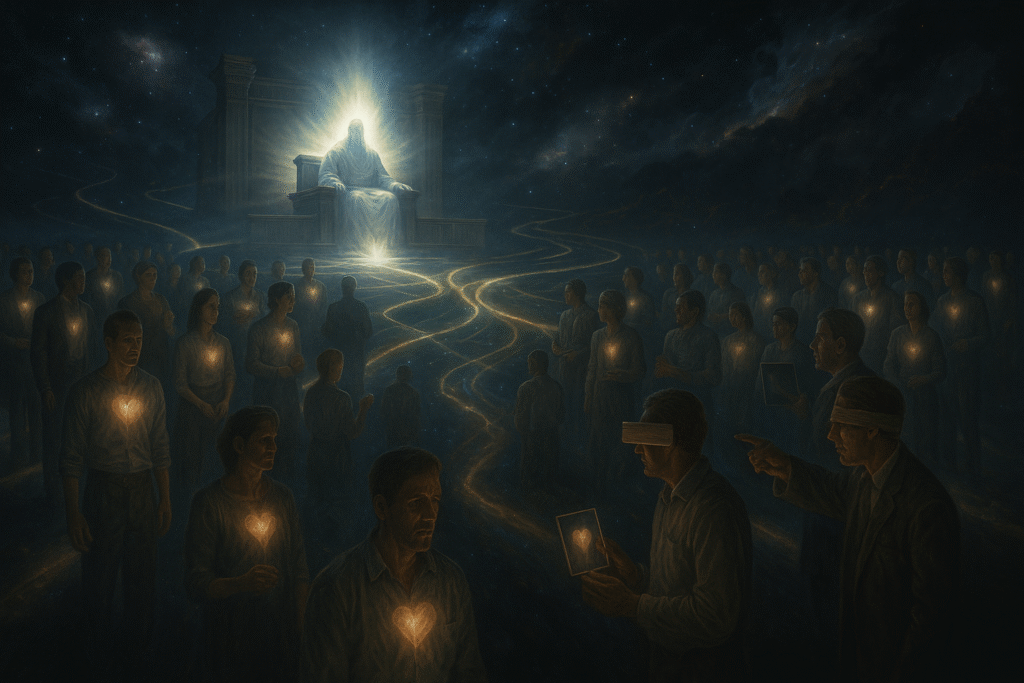Physical Address
304 North Cardinal St.
Dorchester Center, MA 02124
Physical Address
304 North Cardinal St.
Dorchester Center, MA 02124
With Michael Walker
With Michael Walker

A message to the New Creations…

When Yehoshua said in Matthew 7:1, “Do not judge, so that you will not be judged,” most read it as a shallow warning, a moral proverb for keeping peace, a statement as thin as, “Be nice, because if you are harsh, others will be harsh to you.” But this is no proverb of shallow reciprocity, no small piece of wisdom meant to soften social interactions. It is a revelation that pierces into the very structure of man, his blindness, his limits, and his incapacity to see the way Yahweh sees. To understand it, one must first strip away the layers of misconception and open up the framework of how man exists in body, soul, and spirit, and how Yahweh looks not at the surface but at the heart, timelessly, outside of chronology, judging not fragments but the root reckoning of a person’s being. Without this foundation, “judge not” sounds like a command, but with this foundation, it becomes an unveiling of truth: you cannot judge, because you do not have the capacity.
Man is composed of layers. There is the body, the visible shell, the dust from dust, that carries out actions in time. Genesis 3:19 says, “By the sweat of your face you shall eat bread, until you return to the ground, because from it you were taken; for you are dust, and to dust you shall return.” The body is temporal, corruptible, a vessel that carries out deeds but is not the essence of the man. Then there are words, the speech of the tongue, the projections of intention, often elaborate, sometimes deceptive, sometimes sincere but fleeting. Proverbs 18:21 testifies, “Death and life are in the power of the tongue, and those who love it will eat its fruit.” Words carry weight, but they can dress up appearances, presenting something the heart does not hold. They can be intention, they can be projection, they can be hypocrisy. The core, however, is deeper. It is the soul, the nefesh in Hebrew, the psyche in Greek, the heart and mind of a man, the governor of thought, will, and conscience. Proverbs 23:7 says, “For as he thinks within himself, so he is. He says to you, ‘Eat and drink!’ But his heart is not with you.” The Hebrew literally says, “As he reckons in his soul, so he is.” The body may perform, the mouth may speak, but the true man is found in the reckoning of his soul, the place of conscience where he calculates, values, and chooses. Beyond even this is spirit, the ruach, the pneuma, the breath of life Yahweh placed in man at creation. Genesis 2:7 says, “Then the LORD God formed the man of dust from the ground, and breathed into his nostrils the breath of life; and the man became a living person.” Spirit is the field in which the soul lives, the spark that ties man back to his Creator. But the heart, the lev, the mind of the soul, is where Yahweh fixes His gaze, for it is there that the reckoning is made, and it is there that a man is truly defined.
This is why 1 Samuel 16:7 declares, “But the LORD said to Samuel, ‘Do not look at his appearance or at the height of his stature, because I have rejected him; for God does not see as man sees, since man looks at the outward appearance, but the LORD looks at the heart.’” Yahweh does not weigh the fragments—He does not weigh the words isolated, nor the deeds in sequence—He weighs the heart, the governor, the seat of conscience, the reckoning of the soul. Proverbs 4:23 presses this truth: “Watch over your heart with all diligence, for from it flow the springs of life.” Everything outward—words, actions, projections—flow from the inner reckoning. Yehoshua echoed this in Matthew 15:19, “For out of the heart come evil thoughts, murders, acts of adultery, other immoral sexual acts, thefts, false testimonies, and slanderous statements.” The body performs, but it is the heart that directs. The tongue speaks, but it is the heart that conceives. This is why judgment belongs to Yahweh alone, because only He sees the heart in its totality.
The blindness of man in judgment can be likened to watching shadows on a wall. Imagine a man sitting in a cave with only flickers of torchlight, seeing shadows move across stone. He sees a shadow of a bird and assumes it is the bird, but he has not seen the wings, nor the flight, nor the sky. So it is with our judgment. We see fragments, words today, deeds tomorrow, and think we know the whole. But Yahweh is not bound to shadows; He sees the form itself, outside of the cave, in the fullness of light. When we judge, we judge from blindness, and our blindness becomes the very thing judged. Jeremiah 17:9–10 confirms, “The heart is more deceitful than all else and is desperately sick; who can understand it? I, the LORD, search the heart, I test the mind, to give to each person according to his ways, according to the results of his deeds.” Man cannot even know his own heart; how much less can he know the heart of another? This is why Yehoshua’s words are not shallow—they are unveiling truth.
Scripture shows case after case where Yahweh’s timeless judgment is seen. With Pharaoh, mercy was extended time and again. Moses spoke, plagues fell, the command was given: “Let My people go.” Yet before the story unfolded, Exodus 4:21 had already declared, “But the LORD said to Moses, ‘When you go back to Egypt, see that you perform before Pharaoh all the wonders which I have put in your power; but I will harden his heart, so that he will not let the people go.’” Yahweh already saw the heart’s reckoning. With Israel in the wilderness, mercy abounded—manna from heaven, water from the rock, the cloud by day and fire by night—but Numbers 14:11 records Yahweh’s lament, “And the LORD said to Moses, ‘How long will this people be disrespectful to Me? And how long will they not believe in Me, despite all the signs that I have performed in their midst?’” The outcome was foreseen: rebellion would persist, and the generation would fall in the desert. With Judas, the tragedy is sharper. Yehoshua washed his feet, shared bread with him, included him in mercy, but Matthew 26:24 records the verdict, “The Son of Man is going away just as it is written about Him; but woe to that man by whom the Son of Man is betrayed! It would have been good for that man if he had not been born.” The heart was already set. In the days of Noah, mercy stood like an open ark while Noah preached righteousness, but Genesis 6:5 testifies, “Then the LORD saw that the wickedness of mankind was great on the earth, and that every intent of the thoughts of their hearts was only evil continually.” Every possible path was rebellion; judgment was inevitable.
This reveals the paradox of God’s patience. Inside time, mercy is extended. Romans 2:4 says, “Or do you think lightly of the riches of His kindness and restraint and patience, not knowing that the kindness of God leads you to repentance?” Yahweh waits, space is given, repentance is offered. Yet outside of time, He already knows the heart’s reckoning. Hebrews 10:26 warns, “For if we go on sinning willfully after receiving the knowledge of the truth, there no longer remains a sacrifice for sins.” To us it looks like delay, but in truth it is mercy. Yahweh knows if repentance will come; when it will not, His patience ends, and judgment falls.
So why then can man not judge? Because his judgment is bound to fragments in time, bound to shadows on the wall, bound to opinions that dress themselves as verdicts. Forming an opinion is inevitable; the mind calculates, reckons, estimates. But acting from that opinion as if it were righteous judgment—that is blindness masquerading as sight. It is like trying to weigh the depth of the ocean by scooping a handful of water. You might hold the water, but you have not held the sea. To judge another is to scoop, and Yahweh alone holds the ocean in His gaze.
Therefore the instruction stands, “Do not judge, so that you will not be judged” (Matthew 7:1). Not because Yahweh will retaliate against your judgment tit-for-tat, but because to judge is to claim a sight you do not have. To step into His role is to expose your blindness, and your blindness will be judged. This is why the speck and the log follow in Matthew 7:3–5: “Why do you look at the speck that is in your brother’s eye, but do not notice the log that is in your own eye? Or how can you say to your brother, ‘Let me take the speck out of your eye,’ and look, the log is in your own eye? You hypocrite, first take the log out of your own eye, and then you will see clearly to take the speck out of your brother’s eye!” Our sight is obstructed; to judge another from obstruction is to be exposed.
The conclusion is inescapable. Words are fleeting. Actions are partial. Opinions are incomplete. The heart is the true man. Yahweh alone sees the heart, timelessly, outside of time. His judgment is complete because it is not based on fragments but on the root reckoning of the soul across all possible paths of free will. Our judgment is impossible because we are bound to shadows, bound to fragments, bound to blindness. This is why Yehoshua’s words carry such weight—they are not merely ethical commands but ontological truth: you cannot judge, because you lack the capacity. Therefore, guard your heart, for it is the spring of life. Intercede for others, as Stephen did for Saul, because mercy aligns with God’s timeless sight and can shape outcomes we cannot see. And leave judgment to the One whose eyes are not bound to time, whose gaze penetrates the heart, and whose verdict is true.